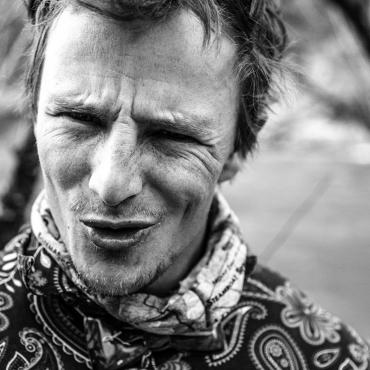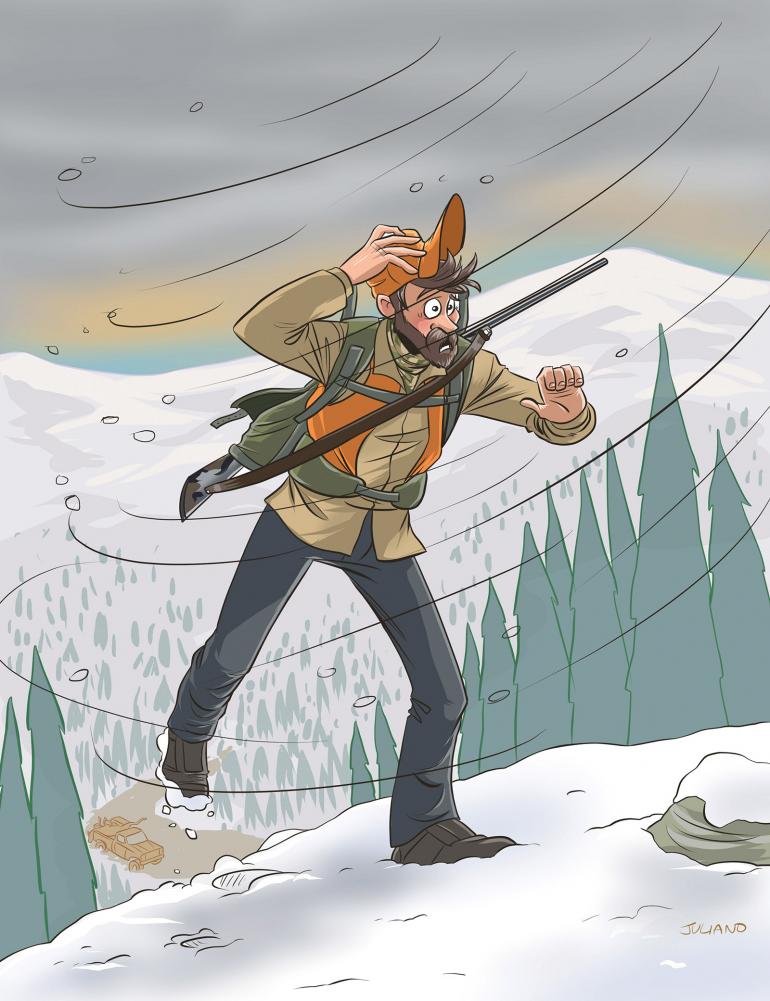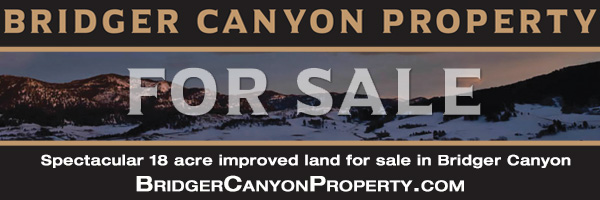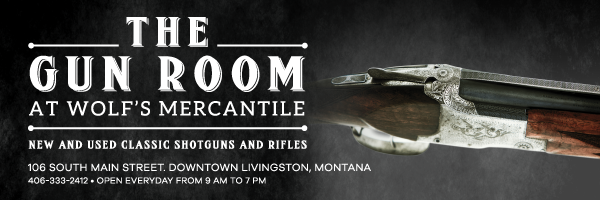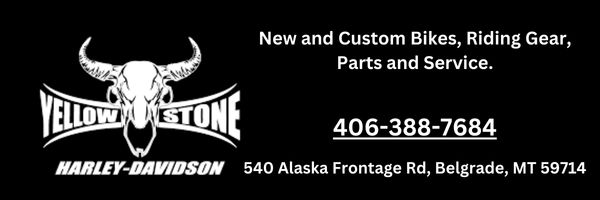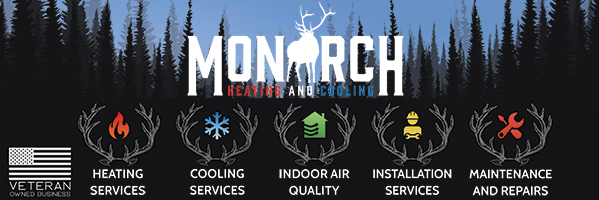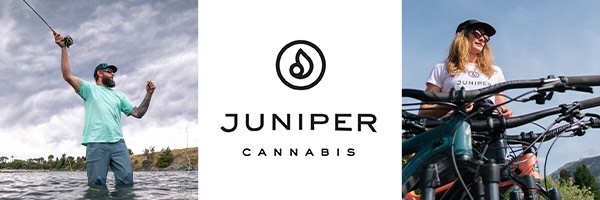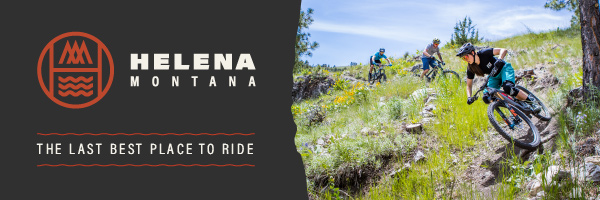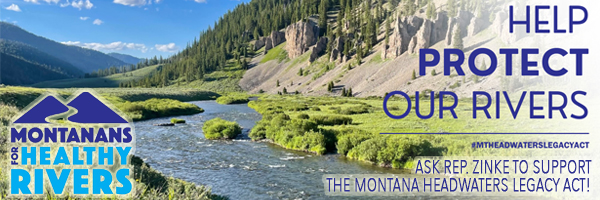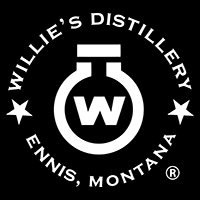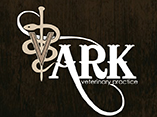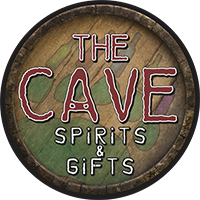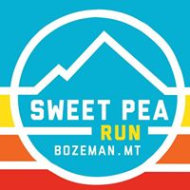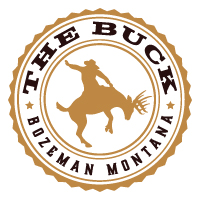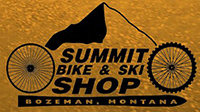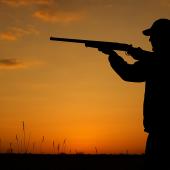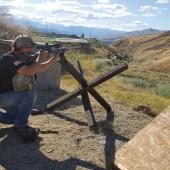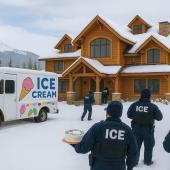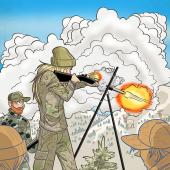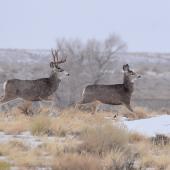A Perfect Storm
How a well-intentioned crew forever alienated a new elk-hunting buddy.
There is something special about tales told in hunting camps. Camps that are way out in the sticks, with no cell service and thus removed from technological distraction. Instead of relying on photos and videos to do it for us, we relate and re-live experiences ourselves, through the ancient art of storytelling—complete with gestures and intonation, animating the whole thing like an actor on stage. It is in these moments when camaraderie is at its most wholesome, whether it’s under a canvas wall tent, in Grandpa’s old camper, or huddled around a flickering bonfire.
In my dad’s camp, most of the old codgers enjoy the late-night storytelling more than the actual hunting itself. The same tales are told every year. Of course, new memories deservedly make their way into the rotation, but there’s a lineup of yarns that are spun like clockwork every season. There’s the one where Darryl got bucked off his horse and landed directly on his tailbone. And the time my dad stuck his head down a hole coming nose-to-nose with a black bear. These stories have been told so many times that their rhythms are polished and predictable. Still, when the punchlines arrive, everyone howls and remarks like they were just revealed for the first time. But of all the sagas, there is one that stands out above the rest. One that baffles any audience, no matter who is listening. One that needs to be written down simply so the people who lived it won’t forget, ‘cause it’s a doozy.
Barclay did well for himself and bagged a cow, and as luck would have it, my grandpa too filled his tag on the same slope, albeit a bit further uphill.
It was Barclay Norby’s first time at hunting camp. Crony of my dad’s college posse, Barclay had more than once been regaled with tales of wandering the deep and dark Montana forests in search of elk. When an invitation was finally extended, he jumped at the opportunity.
In those days, circa 1985, success was rare and wonderful. Halfway through the trip, though, incoming weather had encouraged a herd of elk to actively feed in the open in the middle of the day. Barclay did well for himself and bagged a cow, and as luck would have it, my grandpa too filled his tag on the same slope, albeit a bit further uphill. Details here become a bit foggy. It isn’t clear if they were hunting together or if it was even the same group of elk. What is known is that two animals were down and there was work to be done. A storm was brewing.
This particular drainage had a road contouring up high and a road running along the bottom. Barclay’s rig was up top and grandpa’s was down low. The two dead elk lay on the hill in between. Barclay field-dressed his kill and started the long slog uphill to his truck, to retrieve his pack frame for the haul out.
A few hundred yards away, grandpa had my dad with him working as his de facto mule. Dragging the elk downhill, father and son passed Barclay during his trek up the mountain without either party knowing it. They did, however, run smack into Barclay’s field-dressed cow. Upon seeing the animal, Dad assumed that Barclay would be hiking to his truck with the thought of driving it around to the bottom. Packing an elk to the lower road would be far easier than humping quarters up to the top.
But Barclay was new to camp. He lacked the local knowledge his friends had gained over the years. And, it should go without saying, maps weren’t the same as they are today. Barclay didn’t even know there was a lower road.
With good intentions, Dad and Grandpa lassoed a dragrope around Barclay’s cow and started pulling her downhill as well. They wanted to be as efficient as possible. Dark clouds spit the first flecks of snow. It would be dark soon.
A gust of wind whirled down the drainage and shook both vehicles. Jeff rolled up his window. Dad and Grandpa scurried to take refuge inside their own cab.
Barclay felt the urgency as wind whistled through treetops and bent the tops of lodgepoles, swaying them back and forth. He reached his rig sweaty and tired, and with a pit developing in his stomach. A lot of work lay ahead and time wasn’t on his side. Slugging a quart of water, gearing down, and shouldering his empty pack frame, Barclay headed back down the mountain.
Meanwhile, Dad and Grandpa had made quick work hauling their loads. Turns out, elk do most of the work themselves when sliding down a steep hill. They reached the truck within the hour. While loading the animals in the bed, they turned to see a familiar rig rumbling down the road. It was Jimmy and Jeff, heading back to camp. Jeff rolled the window down and congratulated them.
“Thanks,” Dad said. “This one’s Barclay’s. He’s on his way down to meet us.”
“We may want to pull out of here tonight,” Jeff replied. “This storm could strand us out here all winter.” He pointed to the impending blizzard.
A gust of wind whirled down the drainage and shook both vehicles. Jeff rolled up his window. Dad and Grandpa scurried to take refuge inside their own cab. The interaction was brief and nebulous, but Jeff had made up his mind. Even though they had planned to hunt two more days, he didn’t want to risk getting snowed in. Jeff threw the truck back in gear and started driving back up the ridge toward camp.
“We probably ought to see if Barclay’s rig is still up top,” Jimmy said.
“He did park at the overlook, didn’t he?” Jeff answered, pondering the situation. “We’ll go take a look. Sounds like he’s planning to ride back up with those guys, so we can grab his rig and bring it back to camp. Hopefully he left his keys.”
Meanwhile, Barclay was stumbling his way downhill. When he reached his kill spot, he looked around, stunned. His head panned left to right, scanning the area in front of him. The gut pile lay at his feet. His pink flagging dangled from the branches. But his elk was gone.
Then he saw it: a trail of flattened, blood-stained grass leading down the hill and out of sight. Someone, or something, had taken his kill. He glanced at his watch and then up at the sky. It looked like the heavens were about to unleash something known only to the upper reaches of the Himalayas. His priorities shifted. Elk or no elk, he needed to get back to his truck and the promising safety of the wall tent back at camp. Up the mountain he went.
“Sure enough, here they are!” Jimmy exclaimed, raising his arm and displaying the keychain. “Right in the gas tank, just as you thought.”
“Good deal,” Jeff said. “Now let’s get the hell out of here before we’re stuck for good.”
Jimmy hopped in Barclay’s rig and followed Jeff back down the road. When they reached camp, snow was steadily falling. Their setup was no lightweight operation. They had two canvas wall tents and a steel-barreled wood stove. Comfy living, but a bear to take down. The two went to work like mad men without a plan. They hastily threw gear in the back of both truck beds, stuffed loose items in random nooks and crannies, and locked everything else in place with a spiderweb of ratchet straps. It was a poor game of Tetris, and by the time they were done, Jeff’s truck looked more like the Grinch’s overloaded sleigh than it did a Ford pickup.
When Barclay came to the overlook, his stomach twisted into a knot. His truck—where the hell was it?
Barclay’s heart raced. It was a steep climb to begin with, but he couldn’t get over the fact that his elk had disappeared. He distracted himself by focusing on putting one foot in front of the other until the summit’s horizon edged well into view. When at last he reached the road, a sense of relief washed over him. It was dark now, but he would soon be reminiscing about the day’s events around a warm woodstove with the guys. He thought of how they would all laugh at his predicament, and he cracked a smile finding the humor of it.
But when he came to the overlook, his stomach twisted into a knot. His truck—where the hell was it? He paced to and fro in 100-yard stretches. Though he was new to the area, there was no mistaking this spot. He fumbled through his pockets for a mini-mag flashlight and turned it on. Sure enough, there were tire tracks in the two inches of fresh snow. They appeared to turn around and track back the way he came from that morning. It was a two-mile walk back to camp. There was only one way to go.
The heater roared from the dashboard. Windshield wipers fluttered feverishly as blowing snow started to drift atop the woodpile. “I don’t know where Glenn and Grandpa are, but we better go get ’em,” Jeff said. Jimmy nodded in silent agreement.
Loaded to the brim and beyond, they pulled away and pointed the rigs down the drainage, back to where they left the father-son duo that afternoon. The storm was in full-swing and snow was accumulating fast. Ruts in the road were now completely blanketed white. Keeping straight was a chore.
Barclay rounded the final corner and stopped in his tracks. There was the wood pile, the game pole, the space where camp had stood just a few hours ago. But the tents, the trucks, the woodstove, all his friends—they were nowhere to be seen.
After nearly 45 minutes of white-knuckle driving, they arrived back at the bottom of the canyon, Dad and Grandpa still right where they left them. Jeff pulled his truck up alongside Dad’s and rolled down the window.
“You guys fixin’ to build an igloo?” Jeff remarked. “What’s the hold-up?”
“Still waiting on Barclay,” Dad said. “We thought he’d be down by now.”
“He was planning to hike down, wasn’t he?” Jeff said. “We went and grabbed his truck so we could pack up camp quicker.”
“Camp is packed up? You have Barclay’s truck?”
Barclay grew weary. He’d been out of water since he hit the ridge, but adrenaline had done its job. The road back to camp was relatively flat and easy to follow. He made hay.
Along the home stretch, he peered for smoke rising from the chimney of the wall tent, but couldn’t see through the blinding snow. He was ready for answers. More than that, he was ready for a hot meal. He was clammy and cold and ready to finally sit down in front of a warm fire. He imagined the glorious comfort of climbing into his sleeping bag.
Barclay rounded the final corner and stopped in his tracks. There was the wood pile, the game pole, the space where camp had stood just a few hours ago. But the tents, the trucks, the woodstove, all his friends—they were nowhere to be seen.
He stood there motionless for a minute, flakes piling higher on the brim of his hat and the shoulders of his wool jacket. What was there to do or say? His elk was gone, his truck had disappeared, the entire camp had vanished. It was the middle of the night during the storm of the year and he had no real idea where he was, nor how long it would take to walk back to civilization. His future looked grim.
The trucks motored up the hill three in a row, their headlight beams illuminating upward and earthward as the vehicles rocked with the uneven terrain. Vision was limited to 50 feet. Tires began to spin out on the steeper sections. A patch of dense lodgepole represented exactly a mile from camp. But who knew if Barclay would even be there?
As they approached the stand of pines, the blizzard lightened up and a figure emerged on the road in front of them. There, plodding slowly along the two-track, was Barclay—snow-covered, slumped over, and expressionless, his empty pack frame still shouldered on his back.
Everyone bailed out of the trucks to greet him and try to collectively put the pieces together. Barclay slid silently into the passenger seat as explanations echoed throughout the cab. He didn’t say a word. For the entire drive back to town, Barclay sat in his seat, eyes forward, a speechless deer in the headlights. He never returned to elk camp.
Author’s note: Barclay (understandably) migrated away from that friend group. I have never met him in the flesh. Writing this, I made every effort I could think of—letters, phone calls, emails—to track him down and get his side of the story, all to no avail. It’s quite possible that he doesn’t wish to re-live the events of that fateful day. To me, he will continue to be remembered as the man who, through no fault of his own, lost one thing after another until there was nothing left to lose. If he only knew how many times his story has been told.

